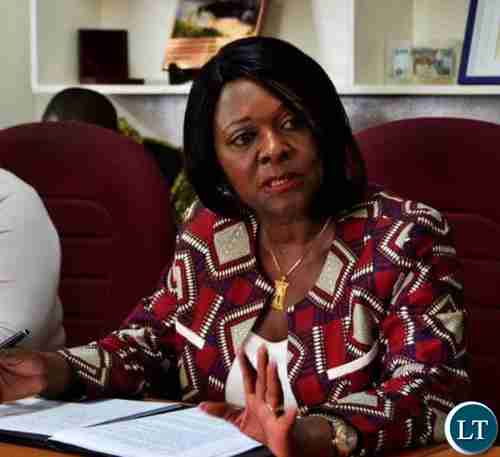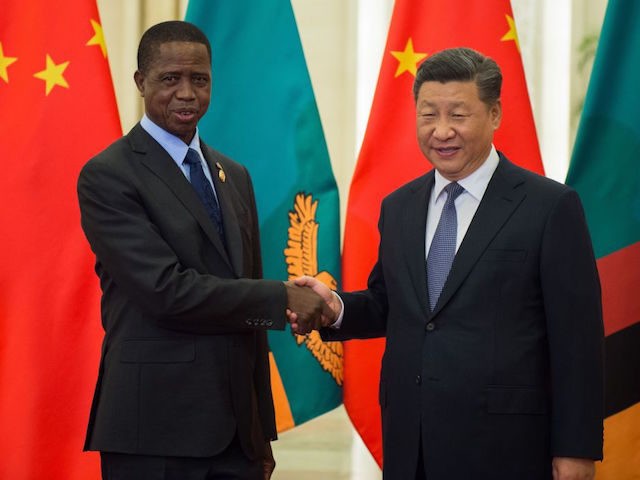This morning’s key headlines from GenerationalDynamics.com
- Zambia denies defaulting on infrastructure loans from China
- Zambia faces long term corruption concerns
Zambia denies defaulting on infrastructure loans from China

Zambia’s finance minister, Margaret Mwanakatwe (Lusaka Times)
Several days ago, outlets reported that Zambia is negotiating with China over a possible takeover of the country’s electricity company, ZEWASCO, after defaulting on loan repayment from a previous loan. That report was based on a news story from Kenya.
There have been numerous news stories in the last couple of weeks claiming that Zambia has fallen victim to a Chinese “debt trap” and is being required to give away not only ZEWASCO but also Zambia’s Kenneth Kaunda International Airport [KKIA].
In addition, a subscriber-only newsletter called Africa Confidential has published reports detailing embezzlement by Zambian officials, led by President Edgar Chagwa Lungu.
Zambian officials are claiming that the news stories, including those in Africa Confidential, are “fake news,” that there is no debt trap, and Zambia will have no problem making payments to China.
Zambia’s finance minister, Margaret Mwanakatwe, issued a statement on Friday:
- There has been no default on debt obligations to China.
- The KKIA terminal is still under construction, so no payments are due yet.
- There have been several loans for the electric company, and some projects are still under constructions, but no loans are in default.
- “For all other loans that have been contracted from the Chinese government, the security on the loans is in form of insurance taken from Sinosure and for state owned enterprises an insurance from Sinosure and guarantee from the government are in place. Therefore, NO COLLATERAL IN THE FORM AS ASSETS has been provided for borrowings and none of the guarantees has been called upon.”
The problem with Mwanakatwe’s protestations is that she is unable to provide any evidence to support them because the entire relationship between Zambia and China, including all contracts, is completely secret. So if there is corruption and embezzlement going on, as Africa Confidential claims, then Mwanakatwe is unable to deny those claims.
In situations like this, there is a test that I always like to apply, namely to ask what the politician would say if all the accusations are true. For example, if a politician is charged with murder, and he says, “I didn’t do it,” then you could ask what he would say if he did, and would say “I didn’t do it.” In other words, the politician would say the same thing whether he committed murder or not. That does not mean he did it, but it does show that everything that comes out of the politician’s mouth is 100 percent worthless, because he’d say exactly the same thing under all circumstances.
So let’s apply this test to Margaret Mwanakatwe. Suppose all the charges of debt trap and embezzlement are true. What would Mwanakatwe say? The answer is that she would issue a statement exactly like the one that she did issue. In fact, the statement is filled with statements that are empty claims because the details are secret, giving me the (unprovable) feeling that the statement is an act of desperation.
This has now become a major international scandal – not in the West, but in Africa. Many African governments are now facing embarrassing questions about revealing the terms of their contracts with China, and about why interest rates are so how, and why default terms are so harsh. Officials will also be asked a lot more questions about whether they are skimming China’s loan money off the top – something they could easily do since all the terms of the contracts are kept secret. Lusaka Times (Zambia) and Zambia Reports and Lusaka Times and VOA
Zambia faces long-term corruption concerns
In June, the Geneva-based NGO, Global Fund to fight Aids, Tuberculosis, and Malaria, suspended $300 million in health funding to Zambia because of alleged corruption in Zambia’s health ministry. Previously, Sweden and the Netherlands stopped health aid and the EU halted road-building funds.
Zambia’s story is a familiar one. Zambia made huge amounts of money from copper mining in the 2000s decade, due to high prices for copper, which makes up 80 percent of exports. When copper prices fell in 2011, instead of decreasing government spending to match reduced income, the new government, led by the Patriotic Front (PF) went on a spending binge. According to the Economist, the PF funded new roads, hospitals, and airports, doubled civil-service wage expenses in the process, and also expanded the number of districts from 72 to 115 so as to dole out more patronage.
Furthermore, the borrowed money was not well spent. In building roads, for example, the World Bank in 2017 found that Zambia paid $360,000 per kilometer, which is more than twice the African average. And since upkeep has been neglected, many new roads are already potholed.
Today, nearly a quarter of government spending goes to make debt payments. The government is broke. The government is delaying salary payments to civil servants, as well as to contractors. Apparently, the government is forced to make debt payments to China, even if it means not paying its own civil servants.
Furthermore, president Edgar Chagwa Lungu is following the same corrupt path that occurs in country after country in Africa – jailing opposition leaders, shutting down newspapers that criticize him, packing the courts with his supporters, and demanding that he stay in power indefinitely, in violation of the constitution.
So even though the country is broke and the government is corrupt, officials say that reports of debt default are “fake news.” Unfortunately, government officials have little credibility and, as in the case of the statement by Margaret Mwanakatwe, there is absolutely no reason to believe anything they say. Economist and BBC and Economist
Related Articles:
- Zambia becomes the next nation to fall victim to China’s ‘debt trap’ (11-Sep-2018)
- China’s railway contractor in Kenya accused of ‘neo-colonialism, racism and blatant discrimination’ (14-Jul-2018)
- Zambia prays for divine intervention in copper prices (19-Oct-2015)
- Copper’s crashing prices cause devastating economic ripples around the world (30-Sep-2015)
KEYS: Generational Dynamics, China, Zambia, Edgar Chagwa Lungu, ZEWASCO, Kenneth Kaunda International Airport, KKIA, Africa Confidential, Margaret Mwanakatwe, Global Fund to fight Aids, Tuberculosis and Malaria, Patriotic Front, World Bank
Permanent web link to this article
Receive daily World View columns by e-mail

COMMENTS
Please let us know if you're having issues with commenting.